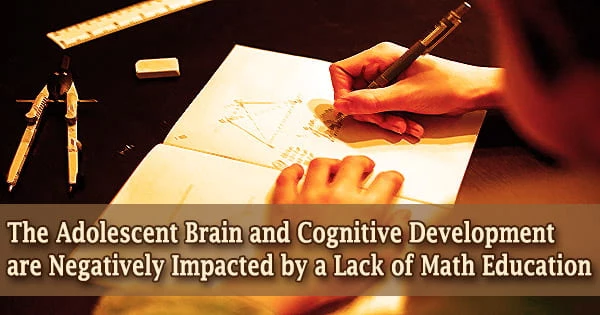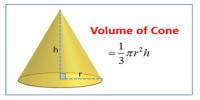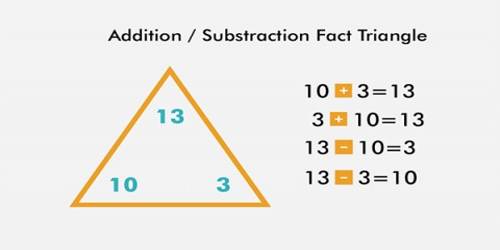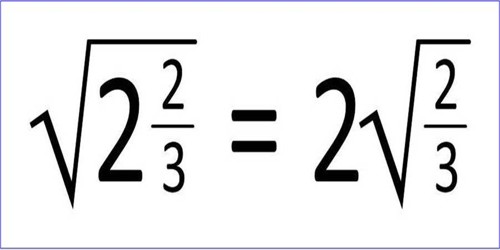According to a new study published in the Proceedings of the National Academy of Sciences, adolescents who stopped studying math had a higher disadvantage in terms of brain and cognitive development than peers who continued to study arithmetic. The Mathematics Education curriculum emphasizes mathematical content as well as the importance of mathematical thinking in the teaching and learning of math.
133 students aged 14 to 18 took part in an experiment conducted by researchers from the University of Oxford’s Department of Experimental Psychology. Unlike the majority of nations throughout the world, 16-year-old children in the United Kingdom have the option of discontinuing their math studies. This setting allowed the researchers to investigate if a lack of math education among individuals from similar backgrounds has an influence on brain development and cognition.
Students who did not study math had lower levels of a vital chemical for brain plasticity (gamma-Aminobutyric acid) in a major brain area linked in several fundamental cognitive activities, such as thinking, problem-solving, arithmetic, memory, and learning, according to the study. Researchers were able to distinguish between teenagers who studied math and those who did not, regardless of their cognitive ability, based on the quantity of brain chemicals present in each student.
Maths skills are associated with a range of benefits, including employment, socioeconomic status, and mental and physical health.
Roi Cohen Kadosh
Psychologist Raquel Libbin, PhD, argues that the critical chemical under investigation will benefit youth in ways we don’t yet completely comprehend. “The role of brain plasticity has made incredible gains in the area of research. It is being applied in many areas of interest such as trauma, mindfulness, anxiety, anger control, and now in education. We never imagined the brain structures could be altered in any way,” she says.
Furthermore, the substance will aid kids in “developing better interpersonal connections, learning to regulate our emotions, such as our anger, and achieving greater educational objectives that lead to better career possibilities and socioeconomic levels.” Math education is linked to “educational advancement, socioeconomic standing, employment, mental and physical health, and financial stability,” according to the study’s findings.
Furthermore, changes in mathematical achievement score roughly 19 months later were correctly predicted by the level of this brain chemical. Notably, the researchers discovered no alterations in brain chemistry before the teenagers ceased studying arithmetic.
Roi Cohen Kadosh, Professor of Cognitive Neuroscience at the University of Oxford, led the study. He said: “Maths skills are associated with a range of benefits, including employment, socioeconomic status, and mental and physical health. Adolescence is an important period in life that is associated with important brain and cognitive changes. Sadly, the opportunity to stop studying maths at this age seems to lead to a gap between adolescents who stop their maths education compared to those who continue it.”
“Our study provides a new level of biological understanding of the impact of education on the developing brain and the mutual effect between biology and education.”
“It’s unclear how this imbalance, or its long-term consequences, may be avoided. Because not every adolescent appreciates arithmetic, we need to look into other options, such as logic and reasoning training, which engages the same brain region as math.”
Professor Cohen Kadosh added, “While we started this line of research before COVID-19, I also wonder how the reduced access to education in general, and maths in particular (or lack of it due to the pandemic) impacts the brain and cognitive development of children and adolescents. While we are still unaware of the long-term influence of this interruption, our study provides an important understanding of how a lack of a single component in education, maths, can impact brain and behavior.”
George Zacharopolous, Roi Cohen Kadosh, and Francesco Sella of the University of Oxford conducted the research (now at the Centre for Mathematical Cognition, Loughborough University).
Michelle Hintz, PsyD, MT-BC, a pediatric psychologist and board-certified music therapist, says, “Math concepts are more than just about numbers. They are about relationships, have spatial and visual components.” She explains that music, in particular, is highly mathematical, as is art.
“The capacity to recognize a part-to-whole link is critical for success in many aspects of our life, including time management and schedule creation, financial budgeting and planning, and so on.” She worries about the “growing trend” in children being unable to perform simple math problems in their heads, pointing to interference by technology.
















